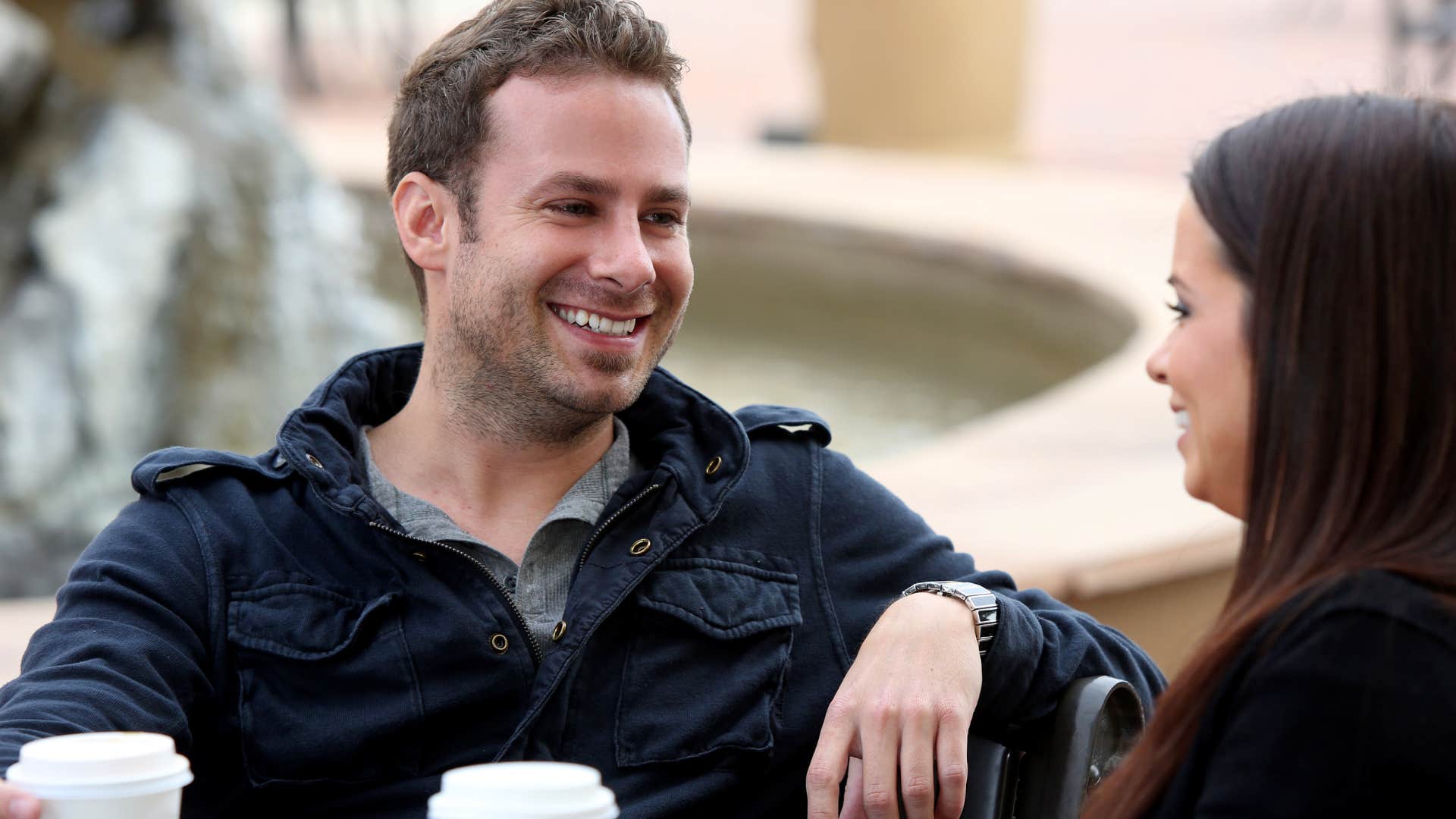People Who Lack Street Smarts Often Think These 11 Things Are Good Ideas
A lack of street smarts means they don't consider the bigger picture.
 Jose Calsina | Shutterstock
Jose Calsina | Shutterstock Having "street smarts" is generally a subjective trait, but in the context of society and when associated with "social intelligence," it's much easier to define what exactly it looks like person-to-person. According to social psychologist Ronald E. Riggio, having street smarts is a learned skill that develops through conversations, personal growth, social interactions, and relationships. Whether it's a framework for expressing emotions or practical knowledge like defensive driving, street smarts can look widely different for each person.
From walking around distracted to oversharing in conversations, people who lack street smarts often think these things are good ideas. Even if having this kind of social awareness is diversely embodied by different people, when an individual lacks it, it's often obvious, aggravating, and plain annoying.
People who lack street smarts often think these 11 things are good ideas
1. Oversharing
 Golubovy | Shutterstock
Golubovy | Shutterstock
Whether it's online, which already has several hyper-specific safety concerns, or with strangers they just met, oversharing is common for people who lack street smarts. They're more focused on their own internal comfort and overcompensating for awkwardness that they end up putting an inappropriate amount of information into conversations.
While it's often a survival instinct for people to overshare to truly connect with others, at least according to a study from Current Directions in Psychological Science, it's still something that has to be approached with care, intention, and caution.
2. Ignoring a gut instinct
 Gorodenkoff | Shutterstock
Gorodenkoff | Shutterstock
Living life with the "YOLO" mentality in mind, people who lack street smarts often get themselves into unfortunate situations by ignoring their gut instincts. They think it's cool and quirky to break the rules and ignore their bodies' natural warning signs, oftentimes at the expense of their later well-being.
Even if it means slowing down, looking inward, and committing to sometimes uncomfortable, yet healthy, habits, people with true social and personal intelligence always listen to their body, mind, and gut.
3. Trusting without boundaries
 Phase4Studios | Shutterstock
Phase4Studios | Shutterstock
People who lack street smarts and general social awareness tend to be overly trusting in people who don't deserve it, according to psychology expert Marty Nemko. Not only are they overly reliant on toxic relationships and partners, but they also trust strangers, people on the internet, and bad friends without boundaries or reservations.
Even when it comes to dating, people who lack street smarts tend to associate attractiveness, rather than intention, evidence, or commitment, with trustworthiness, in ways that can sabotage their well-being and safety.
4. Flaunting their wealth
 Inside Creative House | Shutterstock
Inside Creative House | Shutterstock
Whether it's to get attention from others or to find belonging through consumerism, people who lack street smarts often think things like flaunting their wealth are good ideas, without considering the consequences. Not only can it be harmful to personal reputations and relationships to brag and boast about money, but there are also a number of safety concerns that erupt from this carelessness.
From safety concerns with people noticing your material possessions and money online to being taken advantage of by fake friends, it's often the people who lack common sense that do these things without considering the repercussions.
5. Offering help to everyone
 Koldunov | Shutterstock
Koldunov | Shutterstock
Of course, offering and accepting help — even to strangers — has its benefits, according to a Stanford Report, but when it comes to lending a helping hand to people that you don't know consistently, not everyone has the best of intentions. Whether it's in the grocery store or going out of your way to offer money to someone, sometimes it's a safety risk to help someone when nobody else is around, or it puts your personal health at risk.
People who lack street smarts often think these things are good ideas because they have the best of intentions, but without social awareness, they can put themselves in tricky situations.
6. Assuming everyone has good intentions
 BearFotos | Shutterstock
BearFotos | Shutterstock
Whether it's sharing information about themselves online or helping strangers, people who lack street smarts often believe everyone has good intentions, even when they don't. They get themselves in tricky situations with toxic relationships and safety concerns when they simply trust and assume the best, because they don't offer themselves a chance to prepare for the worst-case scenario.
Of course, constantly catastrophizing and assuming the worst is also unhealthy, but people with true common sense and social awareness are at least aware of what could go wrong and how to protect themselves with boundaries.
7. Procrastinating
 DimaBerlin | Shutterstock
DimaBerlin | Shutterstock
Many people procrastinate to cope with their internal anxiety and fears of failure — avoiding tasks that bring unease or discomfort for instant comfort, rather than true productivity or growth. Of course, it seems like a great idea to push tasks off and live under the mentality of "I work better under pressure," but in the end, it only cultivates more mistrust, stress, and burnout.
According to a 2023 study, chronic procrastination tendencies often spark worsened mental and physical health in people who lack street smarts. They're constantly framing their decisions around personal comfort at the expense of their productivity, success, and trust with others.
8. Lending money to everyone
 AshTproductions | Shutterstock
AshTproductions | Shutterstock
Many people who lack the social awareness to set boundaries around money may offer financial help to anyone who asks. Whether it's to slyly brag about their own financial wealth or to prove they have freedom, they don't always think through the repercussions of offering help to anyone and everyone.
Of course, there's a layer of safety issues to helping anyone, from scammers to people taking advantage, but it's also simply a matter of protecting personal relationships. According to a study from Bankrate, in nearly 50% of situations where a person borrows or lends money to a loved one, it goes wrong, introducing tensions, resentment, and general disconnection into their lives. So, even if it's one of the things people who lack street smarts think are good ideas, it often backfires.
9. Following trends
 DimaBerlin | Shutterstock
DimaBerlin | Shutterstock
People who lack street smarts and self-awareness often think things like following trends and feeding into consumerist cultures are good ideas. They don't know how to connect with themselves on their own, generally because they lack self-awareness and intentional habits, so they turn to social media or the internet to adopt other people's recommendations for comfort, identity, and belonging.
Even if following trends and indulging in these circles on social media offers a bit of comfort or community, they also often sabotage people from truly connecting with their own identity. If they don't already have a foundation of self-esteem or individuality, they're more susceptible to adopting habits and following trends that don't truly embody their best interests.
10. Not wearing a helmet
 Hitdelight | Shutterstock
Hitdelight | Shutterstock
Despite being an obvious decision for people with street smarts and general intelligence, people without them tend to forgo wearing a helmet to look "cooler" or more attractive. Of course, helmets are protective — they're not always meant to be a fashion statement or an aesthetic piece, but a preventative measure to safeguard people riding around on motorcycles or bikes.
Even if it seems like common sense, people without street smarts often lack the knowledge of basic safety habits and practices that other, more socially aware, people engage in on an everyday basis.
11. Always telling the truth
 Mangostar | Shutterstock
Mangostar | Shutterstock
Similar to believing people who don't prove their trustworthiness and assuming the best in everyone, people who lack street smarts often think telling the truth without a filter is a good idea. They don't think about the consequences of oversharing or telling the truth when it comes to their own safety.
Whether it's admitting they're alone, telling people they're a tourist in a new place, or giving out their personal address and information, they don't have the social awareness to recognize that this information could be detrimental to their well-being in the wrong hands.
Zayda Slabbekoorn is a staff writer with a bachelor's degree in social relations & policy and gender studies who focuses on psychology, relationships, self-help, and human interest stories.

